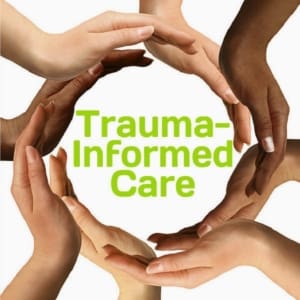
Ethics of Trauma-Informed Care
No matter what the presenting issue might be, the majority of our clients have a trauma history, which we must take into consideration to serve them best.
In this workshop, we will explore the ethical considerations inherent in trauma-informed care, a framework that recognizes and responds to the pervasive impact of trauma on individuals. Participants will gain insights into the core principles of trauma-informed practice, including safety, trustworthiness, choice, collaboration, and empowerment.
This workshop will also address the ethical challenges of maintaining professional boundaries while fostering a therapeutic alliance rooted in empathy and understanding. Participants will explore strategies for managing countertransference and maintaining self-care to prevent burnout, which is particularly important in trauma-focused work. By the end of the workshop, you will have a deeper understanding of integrating ethical considerations into their trauma-informed practice, ultimately enhancing their ability to support and empower clients on their healing journeys.
Upon completion of this training, participants will be able to:
- Describe the components of an ethical trauma-informed practice
- Recognize how to best serve their clients who have a trauma history
- Formulate a plan to ensure that clients feel safe during the therapy session
- Apply a series of steps to minimize client triggering during session
Social workers completing this course receive 2 Ethics asynchronous continuing education credits.
For other board approvals, this course qualifies for 2 hours of Ethics continuing education training.
Course Instructor: Dreya Blume, MA, LCSW
Recording Date: 8/29/2024
Recorded Live Webinar with downloadable presentation slides and/or handouts, evaluation, and a required quiz. The learner is required to pass with a 70% or higher to achieve the CE certificate of completion. The learner is able to reset the test until a satisfactory score is achieved. CE Training Workshops, LLC, provider #1770, is approved as an ACE provider to offer social work continuing education by the Association of Social Work Boards (ASWB) Approved Continuing Education (ACE) program. Regulatory boards are the final authority on courses accepted for continuing education credit. ACE provider approval period: 8/2/2022 – 8/2/2025. CE Training Workshops, LLC has been approved by NBCC as an Approved Continuing Education Provider, ACEP No. 7091. Programs that do not qualify for NBCC credit are clearly identified. CE Training Workshops, LLC is solely responsible for all aspects of the programs. System Requirements: Firefox, Chrome, Brave, Safari, Edge on any modern operating system (Windows, MacOS, Linux, Android, iOS). A desktop browser is recommended. We do not provide support resources for issues encountered using a mobile device. For more information about our policies and board approval statements, please visit our FAQS page.
Dreya Blume, MA, LCSW is a licensed clinical social worker, with her MSW from Radford University and an MA in anthropology from the University of Hawaii. Dreya has twenty years of experience working in mental health, from case management to intensive in-home services to leading groups for addicts in recovery.
Ethics of Trauma-Informed Care (2 HR) Syllabus
I. Foundations of Trauma-Informed Ethics
- Ethical purpose includes safety, autonomy, and minimizing harm
- Trauma-informed care reframes behavior through a trauma lens
- Goal is to prevent retraumatization and replicate trust—not past wounds
II. Understanding Trauma’s Impact
- Trauma alters nervous system regulation and attachment style
- Symptoms may appear as resistance, but are adaptive strategies
- Trauma is relational and healing must occur within safe relationships
III. Informed Consent and Confidentiality
- Trauma-informed consent involves clarity, consistency, and pacing
- Confidentiality must be explained in plain language and revisited regularly
- Clients need control over the therapy process, including boundaries
IV. Transference, Countertransference, and Boundaries
- Therapists must be aware of attachment-based transference
- Countertransference can recreate harmful dynamics if unchecked
- Strong, flexible boundaries foster trust and therapeutic progress
V. Cultural Considerations and Misdiagnosis
- Trauma may be misread as personality disorder or resistance
- Contextualize trauma within family, systemic, and cultural frameworks
- Avoid pathologizing behaviors that are trauma adaptations
VI. Creating Safe Therapeutic Environments
- Safety includes environment design, intake process, and session flow
- Client voices from online forums highlight specific needs for safety
- Physical comfort, therapist consistency, and cultural competence matter
VII. Resourcing and Coping Tools
- Teach grounding techniques and nervous system regulation
- Skills like fidgeting, movement, or silence should be respected in session
- Encourage tools that empower the client, not control them
VIII. Compassion Fatigue and Therapist Ethics
- Burnout and secondary trauma impact ethical decision-making
- Clinicians must monitor emotional exhaustion and seek supervision
- Self-awareness and reflection reduce harm to clients and self
IX. Self-Differentiation and Ethical Integrity
- Based on Bowen’s Family Systems Theory and mindfulness
- Involves self-regulation, emotional boundaries, and a strong internal sense of self
- Prevents enmeshment, overfunctioning, or rescuing behaviors
X. Resources and Continued Growth
- Encourage use of trauma-informed literature and supervision
- Recommend books: The Body Keeps the Score, It Didn’t Start with You, etc.
- Ongoing reflection and education sustain ethical trauma-informed care


